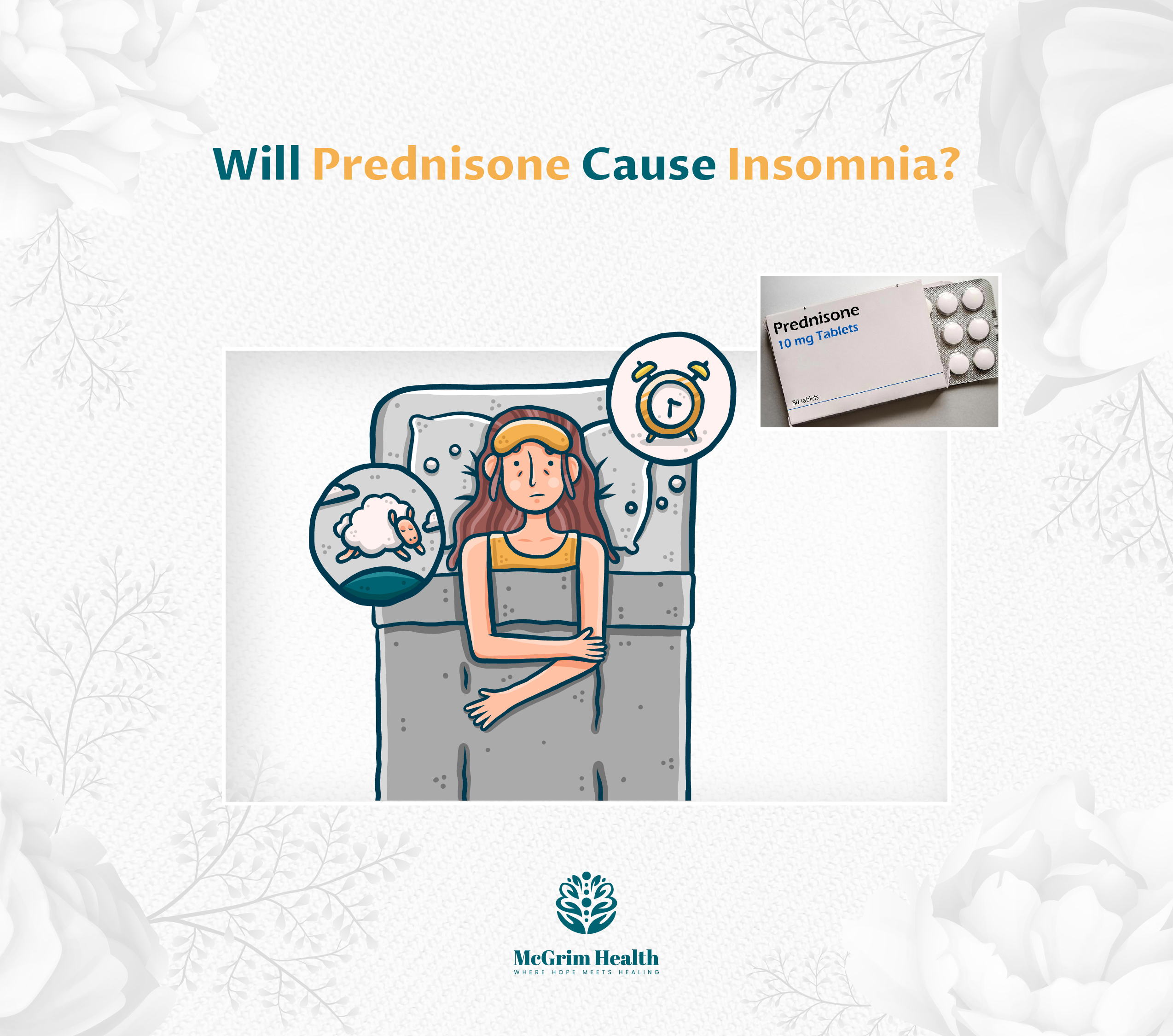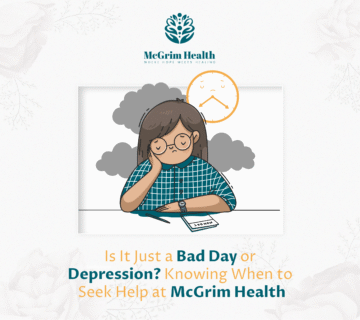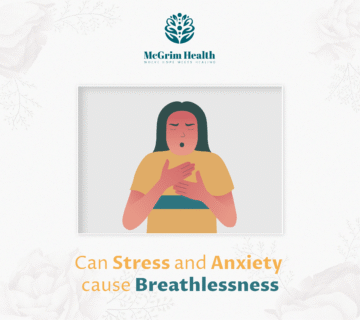Treatment with steroids like prednisone helps many conditions. Yet, it might cause some problems.
Prednisone is a flexible medication that treats a wide range of conditions like allergies and autoimmune diseases.
A major concern is sleep trouble. If you’re using prednisone and asking, ” Will prednisone cause insomnia?”
If Prednisone side effects are causing sleepless nights, McGrim Health has solutions. Our experts will work with you one-on-one to create a personalized plan so that you can get your life back on track.
You deserve better sleep and optimal health. Book an appointment with us today.
Below, we will explore how prednisone affects sleep and provide practical tips to help you manage any disruptions.
What Is Prednisone?
Prednisone acts like a powerful corticosteroid. It battles swelling by copying cortisol, a hormone present in our bodies.
Prednisone is useful for treating allergies and diseases where the body attacks itself. But, it does have downsides. You may gain weight, go through mood changes, develop acne, and notice your hair growing faster.
Serious fallouts, such as bone weakening, might crop up from extended usage or high dose intake.
How Does Prednisone Affect Sleep?
Prednisone, a type of corticosteroid, can mess up your body’s normal patterns and hormone levels.
This upset can cause issues with sleep. For example
- Struggling to go to sleep
- Staying asleep
- Waking up too early
Some people notice that prednisone triggers serious sleeplessness, while others just have small changes. Knowing how prednisone changes sleep can guide you in handling these changes.
Will Prednisone Cause Insomnia?
Yes, prednisone can cause sleep issues. This steroid can act as a stimulant, which might make falling or staying asleep difficult.
Moreover, it might lift your spirit but also lead to discomfort, possibly disturbing your rest cycle.
If sleep difficulty arises due to prednisone, reach out to your healthcare provider without any delay.
They could adjust your dosage or suggest methods to handle these aftereffects.
Factors Contributing to Insomnia with Prednisone
There are a few things that can make it more likely for you to have trouble sleeping when taking prednisone:
- Dosage: With bigger amounts, like 40mg, it’s more common to have sleep issues.
- Timing: If you take prednisone right before bedtime, you might find it difficult to fall asleep. Try to take it earlier in your day instead.
- Individual Sensitivity: People respond differently to medications. Some may find even a low dose of 5mg disruptive, while others may not notice any effect.
How to Beat Prednisone Insomnia?
If you’re struggling with insomnia and prednisone, there are a few methods you can apply to improve your rest:
- Take Medication Early in the Day
Taking your prednisone dose in the morning could help you sleep better. This medication can make you feel energized. So, if you take it in the A.M., your nights might be even more peaceful.
- Establish a Consistent Sleep Routine
Keeping a fixed sleep cycle can combat some sleep irregularities produced by prednisone. Try to settle in and get up consistently each day, including the weekend.
Establishing a calm pre-sleep routine, like enjoying a book or a soothing bath, can guide your body toward relaxation,
- Create a Sleep-Friendly Environment
Make sure your sleep space is good for resting. Make it dark, calm, and cool. If sounds bother you, try earplugs or a noise machine. Also, keep away from screens before sleeping. The blue light they give off can mess with your sleep.
- Limit Caffeine and Stimulants
Stay away from stuff like caffeine, found in drinks like coffee, soda, or tea, later during the day. It can lead to sleep troubles, sticking around in your body for hours. Cut these out, especially when the sun starts setting, and you’ll find sleep comes easier.
- Practice Relaxation Techniques
Prednisone can increase stress and anxiety. However, relaxation techniques can help. Deep breathing calms you. Meditation brings peace.
Progressive muscle relaxation reduces tension and aids sleep. Incorporating these daily can improve calmness and sleep, countering medication side effects.
Combining Prednisone with Other Medications
You might get different medication when also on prednisone. For example, if you’re on doxycycline and prednisone, you need to talk to your doctor.
A common combo is methylprednisolone and melatonin. Melatonin often works as a sleep helper, but when taken with methylprednisolone, it might change how you sleep.
Always talk with your health professional for the best advice.
Be careful with antibiotics and insomnia too.
Some antibiotics could make sleep worse, especially when mixed with prednisone. If you take both, know how they may interact with sleep.
Managing Prednisone Side Effects
To manage prednisone side effects insomnia, consider the following tips:
- Discuss with Your Doctor: Discuss any sleep problems with your doctor. They might suggest a dose change or a different medicine.
- Monitor Your Symptoms: Write down your sleep habits and any other signs. This info can aid your doctor in understanding your condition.
- Lifestyle Adjustments: Make changes to your lifestyle such as maintaining regular sleep timings and ensuring a comfy place to sleep.
When to Consult Your Doctor?
If these strategies do not improve your sleep troubles, a chat with your healthcare provider is worth considering.
Possibly, they may play around with your dose or look into other treatment options. The goal here is to manage your situation without messing up your sleep.
Plus, your doctor may figure out if anything else adds to your issue of not sleeping well. They can then bring in the right methods to mitigate these issues.
Conclusion
Prednisone can be helpful for numerous ailments, but it could interfere with sleep.
Identifying its impact on sleep and finding ways to manage the side effects could improve your overall health.
If you still experience sleep problems, getting guidance from your health provider is crucial. It helps find a balance between treatments and sound sleep.
A better understanding of “Will Prednisone Cause Insomnia?” can help in better controlling your health and improving your sleep by addressing these issues in advance.
FAQs
Does prednisone cause sleepless nights?
Prednisone could indeed disturb your sleep. It has a stimulating effect on the body, potentially causing insomnia. If you’re struggling to sleep due to this medication, consult your doctor. They might adjust your dosage or provide suggestions to improve your sleep
Is 40mg of prednisone a high dose?
Yes, a 40mg dose is relatively high and could increase the risk of side effects, such as sleep problems.
How long after taking prednisone can I take Xanax?
Consult your doctor before combining prednisone and Xanax. This will ensure safety and avoid interactions.





No comment